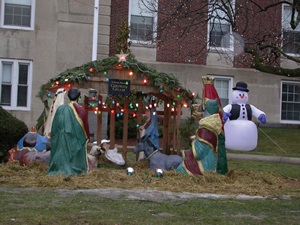In a mixed decision, U.S. District Judge William Smith today ruled that the City of Cranston violated the First Amendment last year when Mayor Stephen Laffey adopted a policy giving his office unbridled authority to approve the erection of “appropriate” displays for the holiday season in front of City Hall. Agreeing with ACLU arguments, the judge ruled that the policy did not “sufficiently protect the free speech rights of Cranston’s citizens.”
At the same time, the Court rejected the ACLU’s argument that last year’s holiday display itself violated the Establishment Clause of the First Amendment. The judge found that because a variety of secular symbols – including fifteen pink flamingoes with Santa Claus hats – were added to the display, it did not create the appearance of sponsorship of religion by the City. The ACLU had argued that the addition of the secular symbols was a “pretext” by the city to promote the religious symbols, but the Court held that had not been proved.
The ACLU’s lawsuit was filed last December after a nativity scene and menorah were placed in front of Cranston City Hall. The suit, filed by ACLU volunteer attorneys Miriam Weizenbaum and Amato DeLuca on behalf of life-long Cranston resident Grace C. Osediacz, argued that both the display and the policy violated the First Amendment.
ACLU volunteer attorney DeLuca said today: “Although we continue to believe that both the Mayor’s policy and the initial display were designed to promote religion, the end result of the court’s decision is very positive. That is, if the Mayor is going to continue to invite the public to erect displays, he will no longer have control over what gets displayed. We fully concur with the court’s comments that ‘reserving unbridled approval authority in any one official, or imposing nebulous constraints on approval discretion (such as limiting disapproval to displays that are not “appropriate” or “suitable”) is not acceptable.’”
Added RI ACLU executive director Steven Brown: “Whenever government gets involved in religion, it ends up trivializing it, as we saw with last year’s display. That is a major reason why religious displays belong on private property, promoted by private individuals and religious institutions themselves, and not by politicians.” Brown said the ACLU would wait and see how the Mayor responded to the ruling during the upcoming holiday season.


